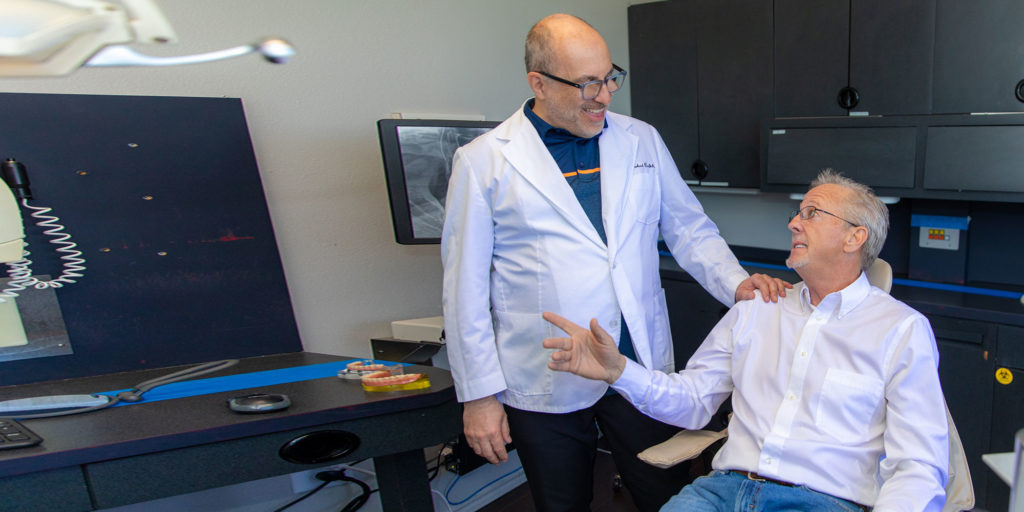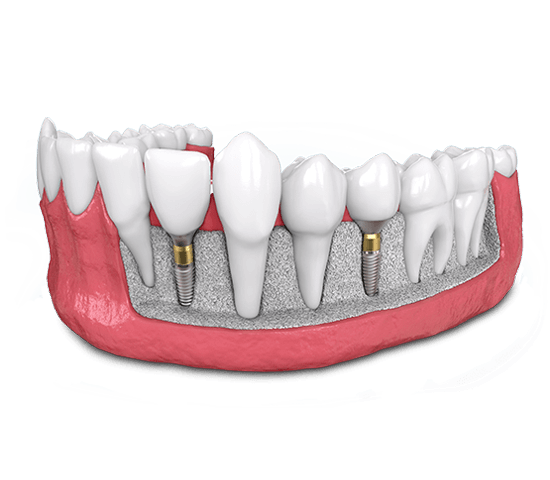

Are you seeking to restore your oral health and enhance your smile? Welcome to DFW Implant Center, where Dr. Farhad Boltchi and his dental team provide advanced bone grafting procedures. In this comprehensive guide, Dr. Boltchi explains bone grafting in its entirety, so you can make an informed decision about your oral health. Learn more by dialing 817-663-4704 if you’re a new patient or 817-467-7731 if you’re a current patient. You can also keep reading the helpful guide below to learn more.
From the dramatic improvements to your self-esteem, to the lasting improvements to your oral and overall health, our braces solutions are designed to offer transformative and long-term results.

Bone grafting transplants bone tissue to restore and fortify weakened or damaged areas of the jawbone or dental socket. This procedure holds a pivotal role in the field of dentistry, addressing a diverse range of issues from tooth loss and gum disease-related bone degradation to bone deficiencies and facial trauma. It offers patients the opportunity to regain facial aesthetics, promote dental implant stability, and ultimately restore not only their oral health but also their confidence in their smiles.
Socket preservation involves preserving the integrity and density of the bone following tooth extraction. This process is essential as it safeguards the overall facial structure, ensuring that the surrounding bone remains healthy and intact.
Maintaining the bone in the socket, creates a stable foundation for future dental implant placement, allowing for a more successful and aesthetically pleasing restoration of missing teeth.
Ridge augmentation is a precise surgical procedure designed to enhance both the shape and size of the alveolar ridge, which is the bony structure that supports the teeth. The primary goal of this technique is to create a strong and stable foundation for dental implants.
By carefully reshaping and rebuilding the ridge, ridge augmentation ensures that the implants can be securely anchored, thereby improving the overall success and longevity of the dental restoration.
Sinus lifts, also known as sinus augmentation, involve gently elevating the sinus membrane in the upper jaw. This elevation creates additional space for the placement of bone material, which is essential for patients who require dental implants in this area.
The procedure is critical for ensuring the security and long-term success of implants, particularly when there is insufficient natural bone present. Sinus lifts provide patients with the opportunity to receive dental implants in the upper jaw without compromising their safety or comfort.
Autogenous bone grafts are a remarkable dental technique where your own bone tissue is harvested, usually from the chin, jaw, or hip, and transplanted to another area in your mouth. This approach is known for its exceptional compatibility as it minimizes the risk of graft rejection or allergic reactions.
By using your own body’s own bone, autogenous grafts often result in optimal integration and long-term stability.
Allografts are a safe and effective option for many patients in need of bone grafting. This method involves the use of donated bone tissue that undergoes meticulous processing and sterilization to ensure its safety.
By employing allografts, patients can benefit from the availability of a readily accessible bone source, which can significantly reduce surgical invasiveness and recovery time.
Xenografts are an innovative bone grafting technique that utilizes specially treated bone material sourced from animals, typically bovine or porcine origins. The unique processing methods eliminate potential immune reactions, making xenografts a viable option for many patients.
This approach conserves your own healthy bone tissue, and provides a safe and effective alternative, reducing the risk of adverse immune responses and promoting successful graft integration.
Synthetic bone grafts are medical materials created to mimic the properties of natural bone. They are used in orthopedic and dental procedures to promote bone regeneration, repair fractures, and fill bone defects, offering an alternative to traditional bone grafts harvested from the patient’s own body or cadaver donors. These synthetic grafts are biocompatible and can facilitate new bone formation, making them a valuable tool in various medical applications.

Bone grafting offers numerous benefits, some of which include the following:
Bone grafting may be recommended if you:
A periodontist is a highly specialized dental professional with advanced training in addressing issues related to both soft tissues and bone in the oral cavity. Beyond their comprehensive expertise in performing intricate bone grafting procedures, a periodontist possesses the skill to enhance the aesthetics of soft tissue.
Opting for bone grafting treatment from a periodontist like Dr. Farhad Boltchi offers enduring advantages for your overall health, oral function, and the esthetic appeal of your smile. Moreover, as an authority in the realm of dental implants, our periodontist can not only assist you in becoming a candidate for dental implants but also reliably replace all your missing teeth with this secure, long-lasting, and remarkably lifelike solution.
The journey begins with a comprehensive consultation with Dr. Boltchi at DFW Implant Center in Arlington, TX. During this initial meeting, your oral health is thoroughly assessed. Our periodontist will discuss your treatment options, including the need for a bone graft.
This consultation is the foundation for creating a personalized treatment plan. The periodontist will address your concerns, answer any questions, and explain the entire process, making sure you’re well-informed and comfortable with the upcoming procedure.
Before the surgical day, specific preparations are made. Patients may be asked to discontinue certain medications that could affect the procedure, and a pre-operative examination will ensure that you are in optimal health for surgery. Sedation dentistry options will be discussed, which can be used alongside local anesthesia to further ensure your comfort during the procedure.
The choice of synthetic bone grafts or non-synthetic bone grafts is also determined during this phase. The decision depends on your specific needs and the periodontist’s recommendations.
On the day of the procedure, local anesthesia will be administered to ensure you feel no pain during the surgery. The surgical site is carefully cleaned and prepared.
Once the bone graft material is ready, it is meticulously placed in the targeted area. Our periodontist ensures that the bone grafting material is precisely positioned and secured. The surgical site is then closed with sutures to facilitate healing. Throughout the procedure, the utmost attention is given to every detail, from bone preparation to graft placement.

Recovery after a bone graft surgery is a critical phase in the process, as it directly influences the success of the procedure and your overall oral health. Here, Dr. Boltchi provides a detailed guide to help you navigate the postoperative period and promote effective healing.
The duration of the bone grafting procedure varies based on complexity and graft type, typically ranging from 45 minutes to a few hours. However, the exact length of time will depend on the patient’s unique case.
No, bone grafting isn’t painful. You’ll be under anesthesia during the procedure, so you won’t feel pain. Some discomfort and swelling are normal after surgery, but medications will help manage this.
The length of time between a bone graft and being able to receive dental implants typically ranges from three to six months after the bone graft procedure. However, the time varies from patient to patient.
Insurance coverage depends on your insurance plan and the medical necessity of the graft. Your dental team can assist you in verifying your coverage.
Learn more about the many benefits of bone grafting by dialing 817-663-4704 if you’re a new patient or 817-467-7731 if you’re a current patient. You can also fill out the online contact form and one of our friendly team members will get back to you shortly. We’re proud to serve patients from Arlington and surrounding areas such as surrounding areas such as Irving, Fort Worth, and Grapevine, TX.
I understand the information disclosed in this form may be subject to re-disclosure and may no longer be protected by HIPAA privacy regulations and the HITECH Act.

800 West Arbrook Blvd
Suite 360 Arlington, TX 76015